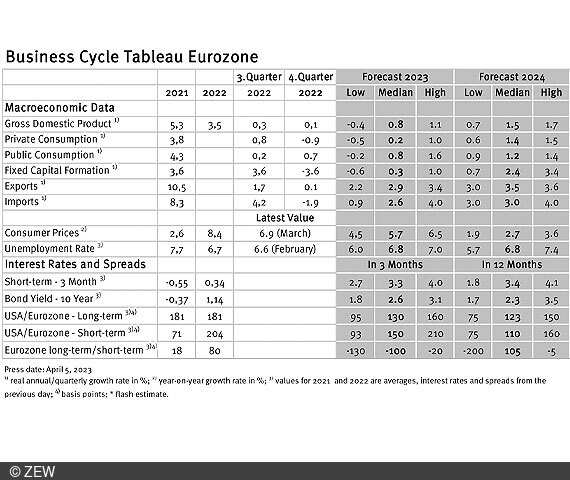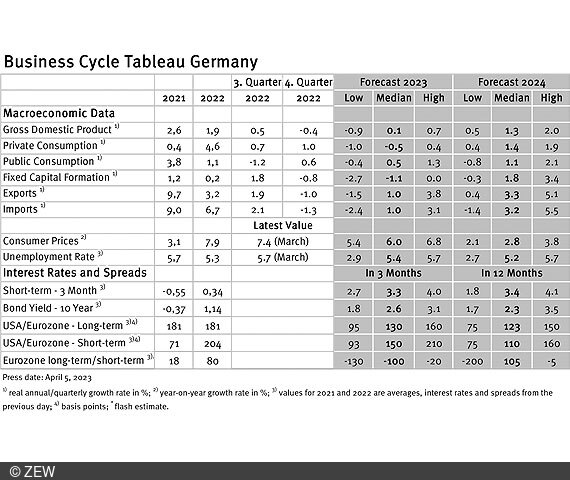End of Economic Downturn in Sight
Business Cycle Tableaus by ZEW and Börsen-ZeitungBusiness Cycle Experts Lift Growth Forecast for the Eurozone
Business cycle experts are more optimistic about real GDP growth in the eurozone than in the previous month. The economic outlook for Germany is also slightly better compared to last month, although the danger of a recession remains. Inflation is likely to continue to fall, but it is not expected to come closer to the European Central Bank’s target rate until next year. These are the results of the business cycle tableaus by ZEW Mannheim and the German daily newspaper, Börsen-Zeitung.
Growth forecasts for the eurozone have improved for the current year. They are currently at 0.8 per cent, 0.6 percentage points higher than in the previous month. This is mainly due to more favourable forecasts for private consumption, fixed capital formation and net exports.
Eurozone: After hitting bottom, things are (slightly) going up again
While growth of 0.8 per cent may not be a particularly strong economic development, the good news is that a recession in the euro area no longer seems very likely. For 2024, the experts’ forecasts remain unchanged at 1.5 per cent. This means that the bottom of the economic downturn should be reached in 2023, followed by a slow increase next year.
Inflation will not ease significantly until 2024
Consumer price inflation forecasts for 2023 are slightly lower than last month. They are currently at 5.7 per cent, compared to 6.0 per cent in the previous month. The forecast for 2024 remains virtually unchanged. At 2.7 per cent, next year’s inflation rate is expected to be much closer to the ECB’s target.
Despite improved outlook: Recession in Germany quite likely
The picture for Germany is fairly similar. The GDP forecast rises from minus 0.3 per cent (previous month) to currently 0.1 per cent. However, in contrast to the eurozone, a recession is still quite likely for the German economy. In 2024, growth is expected to be slightly weaker than in the eurozone at 1.3 per cent.
The experts’ current inflation forecast for Germany is 6.0 per cent for 2023, 0.2 percentage points less than in the previous month. In 2024, the inflation rate is expected to be 2.8 per cent, roughly the same as in the eurozone.
Business Cycle Tableaus by ZEW and Börsen-Zeitung
In cooperation with Börsen-Zeitung, ZEW has been publishing monthly business cycle tableaus for Germany and the eurozone with economic key figures and forecasts since 2013. Numerous banks and institutes publish reports on the current and prospective economic situation at different intervals. The information relevant for the tableau is filtered out of these publications to compute a median, minimum and maximum of the available forecasts for the current and subsequent year.
The monthly tableaus show current GDP forecasts, its main components, consumer prices, industrial production, unemployment rate, short- and long-term interest rates, and interest rate spreads. The focus of the tableaus lies on national business cycle reports, which are complemented with forecasts from international banks and institutes. The tableau for the eurozone is enhanced by data from European banks and institutes.

